Starting from:
$14.95
Home
World War II
World War II: United States Army European Command Post-War Occupation of Europe Reports (1945-1966)
World War II: United States Army European Command Post-War Occupation of Europe Reports (1945-1966)
World War II: United States Army European Command Post-War Occupation of Europe Reports (1945-1966)
12,247 pages, composed of 54 studies, monographs, and narratives of the history of the occupation of Europe and post-occupation deployment in Europe, produced by the United States War Department Office of the Chief of Military History covering and composed during 1945 to 1966. When created the volumes were classified as SECRET.
The volumes include:
The First to Fourth Years of the Occupation - Occupation Forces in Europe Series
35 volumes covering the years 1945 to 1948.
The War Department directed that the history of the military occupation of Germany and Austria be recorded and interpreted as those events transpired. The agency given the task of performing this history was the Office of the Chief Historian, European Command. Each volume is based upon a thorough study of the correspondence, directives, and other documents relating to each subject.
The documents address general aspects of the occupation (terms of surrender and enforcement, international aspects of the occupation), personnel and administration (military/civilian personnel, recreation, Army Exchange Service, fraternization, shipment of dependents to ETO and establishment of military communities, shipments of war brides, etc.), and intelligence (law, order, security, censorship, public safety). Sections detail the education and troop information programs, (German youth activities, the U.S. Constabulary, training problems and technical schools) services (supply, transportation, communications, real estate and construction, surplus property, captured enemy material, medical policies and operations), and civil affairs (staff relationship in civil affairs and military government under the G-5).
Topics include the defeat of Germany, the United States forces on V-E Day, the U.S. in transition, the assumption of the occupation mission, the maturation of the policies and organization of the occupation, the manpower problem, organization and functioning of the occupation, accomplishments of the occupation, three examples of United States occupation, general aspects of the occupation, personnel and administration, intelligence, education and troop information programs, services, and civil affairs.
Annual Historical Reports of the Headquarters US Army Europe (USAREUR) Five Volumes 1953 to 1959
United States Army, Europe (USAREUR) received a new mission in 1953 becoming part of the newly activated U.S. European Command (US EUCOM), along with two other commands, Commander in Chief, Naval Forces Eastern Atlantic and Mediterranean (CIKCNEDi) and the Commander in Chief, United States Air Forces in Europe (CINCUSAPE).
Occupation Forces in Europe Series Individual Topics
Volumes include:
Fraternization with the Germans in World War II
Covers the policy of nonfraternization before V-E Day; nonfraternization from V-E Day to 30 September 1945; abandonment of the policy of nonfraternization; and the pattern of fraternization.
Redeployment
Table of contents include: planning for redeployment in the European Theater of Operations; redeployment procedures and operations prior to V-J Day; V-J Day and its effects; September through December 1945- clearance of excess troops; and redeployment of the close-out force.
Reorganization of tactical forces, V-E Day to 1 January 1949
This document discusses concepts of the occupation in Europe, military force requirements, use of strategic reserves, reorganization of the U.S. constabulary in 1948, reorganization of the 1st Infantry Division in 1948, and the development of U.S. Army, Europe.
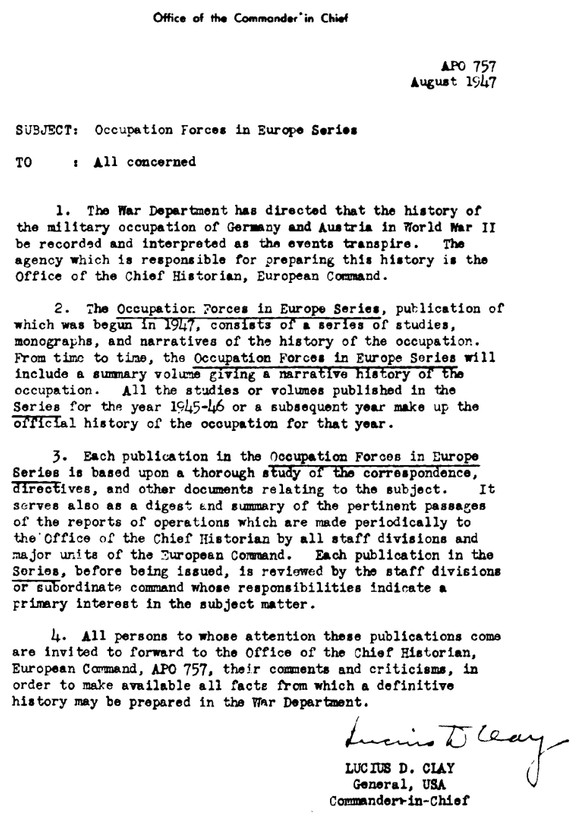
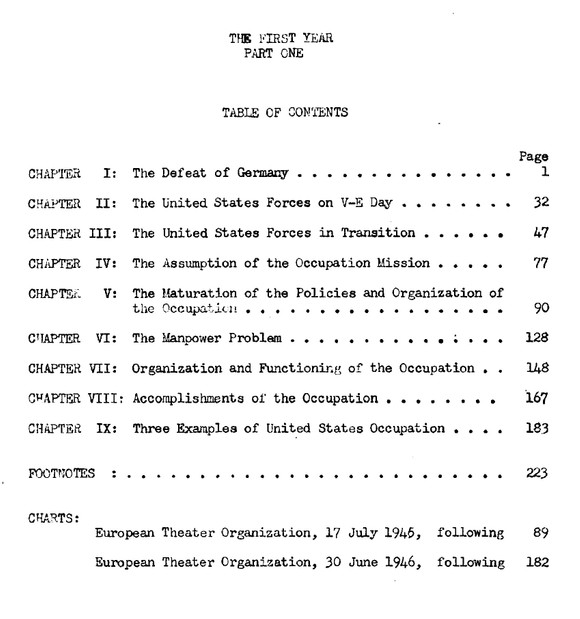
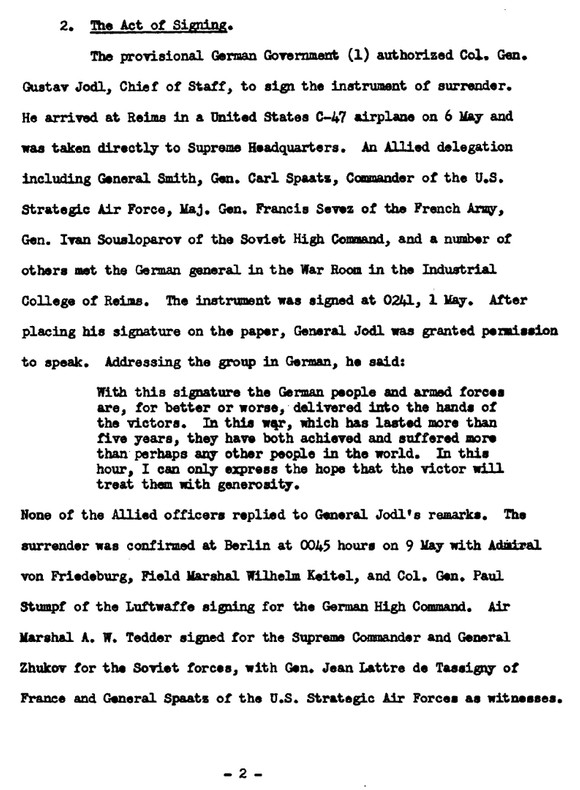
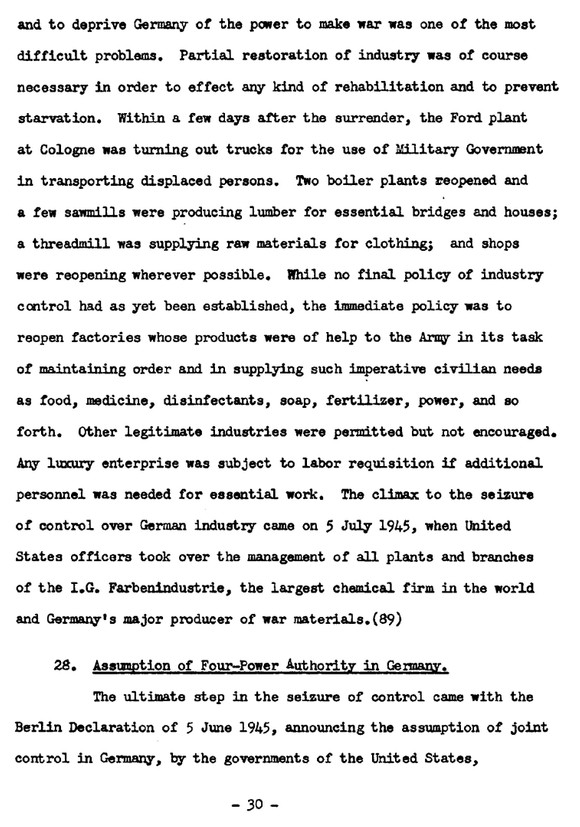

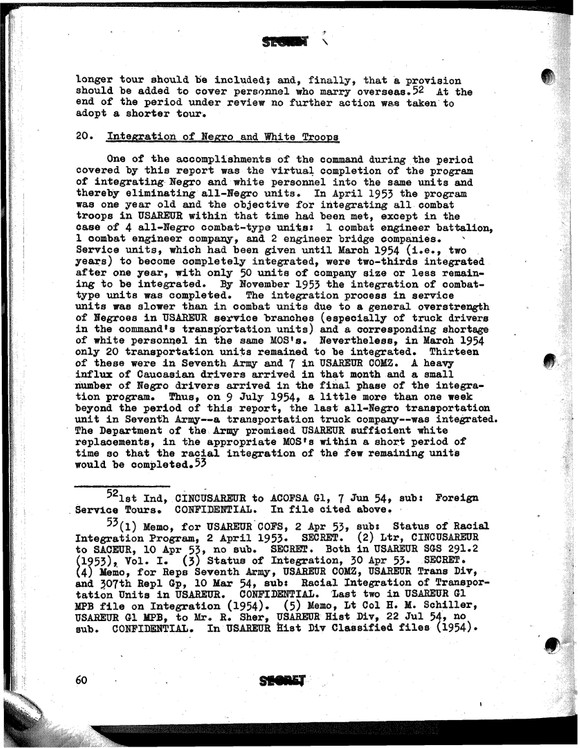

12,247 pages, composed of 54 studies, monographs, and narratives of the history of the occupation of Europe and post-occupation deployment in Europe, produced by the United States War Department Office of the Chief of Military History covering and composed during 1945 to 1966. When created the volumes were classified as SECRET.
The volumes include:
The First to Fourth Years of the Occupation - Occupation Forces in Europe Series
35 volumes covering the years 1945 to 1948.
The War Department directed that the history of the military occupation of Germany and Austria be recorded and interpreted as those events transpired. The agency given the task of performing this history was the Office of the Chief Historian, European Command. Each volume is based upon a thorough study of the correspondence, directives, and other documents relating to each subject.
The documents address general aspects of the occupation (terms of surrender and enforcement, international aspects of the occupation), personnel and administration (military/civilian personnel, recreation, Army Exchange Service, fraternization, shipment of dependents to ETO and establishment of military communities, shipments of war brides, etc.), and intelligence (law, order, security, censorship, public safety). Sections detail the education and troop information programs, (German youth activities, the U.S. Constabulary, training problems and technical schools) services (supply, transportation, communications, real estate and construction, surplus property, captured enemy material, medical policies and operations), and civil affairs (staff relationship in civil affairs and military government under the G-5).
Topics include the defeat of Germany, the United States forces on V-E Day, the U.S. in transition, the assumption of the occupation mission, the maturation of the policies and organization of the occupation, the manpower problem, organization and functioning of the occupation, accomplishments of the occupation, three examples of United States occupation, general aspects of the occupation, personnel and administration, intelligence, education and troop information programs, services, and civil affairs.
Annual Historical Reports of the Headquarters US Army Europe (USAREUR) Five Volumes 1953 to 1959
United States Army, Europe (USAREUR) received a new mission in 1953 becoming part of the newly activated U.S. European Command (US EUCOM), along with two other commands, Commander in Chief, Naval Forces Eastern Atlantic and Mediterranean (CIKCNEDi) and the Commander in Chief, United States Air Forces in Europe (CINCUSAPE).
Occupation Forces in Europe Series Individual Topics
Volumes include:
Fraternization with the Germans in World War II
Covers the policy of nonfraternization before V-E Day; nonfraternization from V-E Day to 30 September 1945; abandonment of the policy of nonfraternization; and the pattern of fraternization.
Redeployment
Table of contents include: planning for redeployment in the European Theater of Operations; redeployment procedures and operations prior to V-J Day; V-J Day and its effects; September through December 1945- clearance of excess troops; and redeployment of the close-out force.
Reorganization of tactical forces, V-E Day to 1 January 1949
This document discusses concepts of the occupation in Europe, military force requirements, use of strategic reserves, reorganization of the U.S. constabulary in 1948, reorganization of the 1st Infantry Division in 1948, and the development of U.S. Army, Europe.







1 file (448.6MB)



